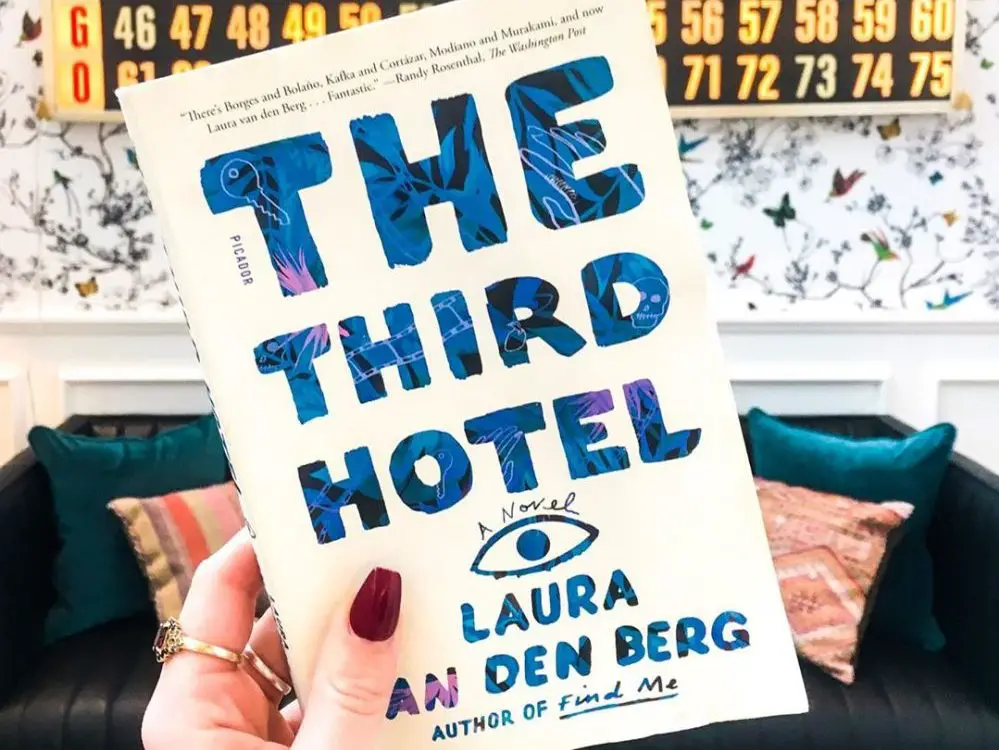Laura van den Berg’s second novel, “The Third Hotel,” is often categorized as a kind of hybrid genre: psychological realism. Whereas magical realism, notably explored by Gabriel García Márquez and Isabel Allende, takes magical elements and incorporates them into the prose as if they genuinely occurred, van den Berg’s psychological realism employs the tactic with psychological elements. The result is a piece of fiction that combines internal and external worlds, the tangible and the imagined and the factual and the fabricated.
“The Third Hotel” would be a fascinating read at any moment in time, but reading her book in today’s context — the thick of the coronavirus pandemic — I felt especially connected to the protagonist, Clare, and her experience, not only physically but psychologically.
After losing her husband, a film professor, in a motorway accident, Clare travels to Havana, Cuba, to go to the film festival that she planned on attending with him. In the beginning, the details of the story are clear. Clare explores the city and ponders the implications of being a traveler and thus an outsider within a society. She attends the screening of “Revolución Zombí,” the groundbreaking film her husband had been looking forward to seeing.
However, as the novel progresses, the plot begins to unravel. First, in subtle ways — the narration begins to stray from chronology and jump unexpectedly between moments in space and time. Then it quickly unravels — to the point that the reader has a hard time locating Clare in the setting that van den Berg has established.
But Clare’s psychological disconnect from a sense of time and place does not just crop up out of nowhere in the middle of “The Third Hotel.” In fact, as a New York Times review of the book points out, the protagonist announces her detachment on the very first page. “I am not who you think I am,” she imagines telling an acquaintance. “I am experiencing a dislocation from reality.”
A dislocation from reality. From this line onward, Clare’s experiences felt familiar to me. Reality is, in some ways, a driving force that charges onward regardless of the human condition. Even when the U.S. was locked down, buses still ran, clocks still ticked and many continued to do their jobs.
But since the onset of the COVID-19 pandemic, our world has felt somehow dislocated from its usual progression. I have never been more aware not only of my own mortality, but also of the mortalities of my family members, some of whom are essential workers, and of my friends and loved ones.
I know that time is still moving forward, but I am experiencing it differently. I am no longer quite as tethered to “reality” as I once was.
And Clare’s experience only becomes more relevant as she loses her attachment to reality as well. Van den Berg expertly manipulates time throughout the novel so that the reader is never quite sure if it is morning or evening. How many days have passed since the narration began? How long has Clare spent talking to a film producer or walking around her hotel room?
As someone who has had the privilege of working from home throughout the pandemic, the passage of time is not something that I have needed to pay any particular attention. Like Clare’s, my days blend together. During the early days of the pandemic, which I remember with a kind of nightmarish clarity, it was difficult to envision an end to the outbreaks and the deaths in the same way that I imagine it is difficult for Clare to imagine an end to her grief for her husband.
And thus, the days swirled and blended, the moments stretched and the weeks compressed until it was difficult to find any kind of linear progression to latch onto.
Not only did I relate to Clare’s experience of time, but I also related to her character in a way that I might not have if COVID-19 never occurred. Akin to Clare’s experience of a life-changing loss that permanently alters the way she moves through the world, I have left school and my best friends, abandoning the connections that have shaped my experience of young adulthood. And compared to others, my losses are minimal. Many people have also lost loved ones, jobs, homes and relationships.
Alone with her loss in an unfamiliar place, Clare recounts her former travels for her job as an elevator salesperson, most memorably her discovery of a human fingernail in the nightstand drawer of an otherwise immaculate hotel room. Clare is fascinated by the fingernail, turning it over in her hands, contemplating its origins, grasping onto this glimpse of humanity.
Like those who have gotten used to scheduling their day around Zoom calls or taking walks in their neighborhoods when they feel most alone, Clare craves a human connection, anybody who might also be experiencing a “dislocation from reality.”
Just like I have felt during the pandemic, throughout the novel, the reader feels as though they are drifting between the “real” and the “fabricated” — I include quotation marks around both words because there is no clear delineation between the two worlds in van den Berg’s novel, nor is there such a line in our own experiences of life.
The pandemic has reminded me that many of the structures I rely on, such as my schedule and my identity as a college student, are more so constructions of human interaction than tangible truths.
In the same way that Clare slips in and out of the realm of physical experience, I have found myself losing touch with the reality of the virus that is raging around us due to my privilege and resulting ability to stay home.
I am reminded of the immediacy of the current reality only when I hear my mom, a healthcare worker, on the phone with a patient who has recently tested positive, or when I hear about specific individuals I know who are fighting the illness. It is hard to keep track of what is real when I am removed from the outside world.
While I am sure I would have appreciated reading van den Berg’s novel at another time in my life, and perhaps other books in the genre of psychological realism, experiencing the COVID-19 pandemic undoubtedly heightened my understanding of “The Third Hotel.”
But there is one key difference between my dislocation of reality and Clare’s. While Clare wanders the streets of Havana alone, I have experienced the coronavirus alongside the rest of the world. Perhaps it is the collectivity, the nature of this experience that is in some ways very mutual, that has allowed me to continue separating the imagined world and the real world in a way that Clare cannot.

















